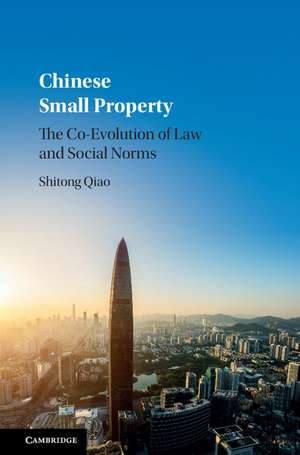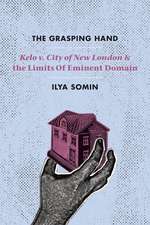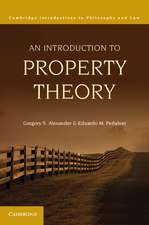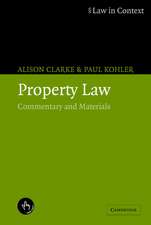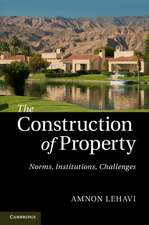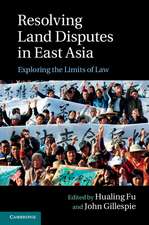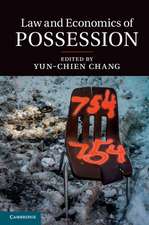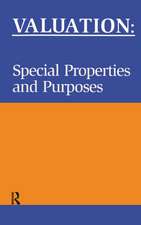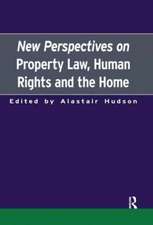Chinese Small Property: The Co-Evolution of Law and Social Norms
Autor Shitong Qiaoen Limba Engleză Hardback – 18 oct 2017
| Toate formatele și edițiile | Preț | Express |
|---|---|---|
| Paperback (1) | 281.88 lei 6-8 săpt. | |
| Cambridge University Press – 20 feb 2019 | 281.88 lei 6-8 săpt. | |
| Hardback (1) | 729.26 lei 3-5 săpt. | +20.79 lei 6-12 zile |
| Cambridge University Press – 18 oct 2017 | 729.26 lei 3-5 săpt. | +20.79 lei 6-12 zile |
Preț: 729.26 lei
Preț vechi: 801.38 lei
-9% Nou
Puncte Express: 1094
Preț estimativ în valută:
139.58€ • 145.17$ • 116.97£
139.58€ • 145.17$ • 116.97£
Carte disponibilă
Livrare economică 21 februarie-07 martie
Livrare express 06-12 februarie pentru 30.78 lei
Preluare comenzi: 021 569.72.76
Specificații
ISBN-13: 9781107176232
ISBN-10: 1107176239
Pagini: 230
Ilustrații: 11 b/w illus. 10 tables
Dimensiuni: 158 x 235 x 16 mm
Greutate: 0.46 kg
Editura: Cambridge University Press
Colecția Cambridge University Press
Locul publicării:New York, United States
ISBN-10: 1107176239
Pagini: 230
Ilustrații: 11 b/w illus. 10 tables
Dimensiuni: 158 x 235 x 16 mm
Greutate: 0.46 kg
Editura: Cambridge University Press
Colecția Cambridge University Press
Locul publicării:New York, United States
Cuprins
Introduction; 1. The evolution of land law in China: partial reform, vested interests, and small property; 2. Planting houses in Shenzhen; 3. Small property, big market: a focal point explanation; 4. Small property, adverse possession and optional law; 5. Small property in transition: a tale of two villages; 6. All quiet on the judicial front?; Conclusion: market transition: sticky norms or sticky law?
Recenzii
'Can a vibrant real estate market arise in a nation with a stunted legal system? Hernando de Soto famously thought not. Splendidly interweaving field findings with social-scientific theory, Shitong Qiao dismantles the de Soto thesis. In many Chinese cities, booming housing markets have rested largely on informal understandings.' Robert Ellickson, Walter E. Meyer Professor of Property and Urban Law, Yale Law School
'In this remarkable book, Shitong Qiao not only illustrates the intricacies of China's booming periurban land market but also demonstrates how Chinese peasants, together with newly urbanizing industrial workers, have fashioned extensive systems of informal 'small property' commercial land transactions, in spite of a legal system that purportedly forbids them. Qiao's book offers a nuanced discussion of the relationships between law and social norms in Chinese land markets, along with a significant rejoinder to the view that dynamic land markets depend on formal systems of property law.' Carol M. Rose, University of Arizona
'A fascinating exploration of the lively housing market that arose in suburban Shenzhen outside the framework of formal law. Based on in-depth field research, Qiao documents the residential building boom, and he then assesses both the strengths and the ultimate limitations of extra-legal arrangements as engines of development.' Susan Rose-Ackerman, Yale University, Connecticut
'In this multi-disciplinary work, Qiao has taken Robert Ellickson's pioneering work on social norms and property rights from rural California to Shenzhen, China, one of the world's fastest growing, most complex urban markets. In doing so he has demonstrated that much of what we thought we knew about law, property rights, social norms, and development was incomplete at best and flat wrong at worst.' Frank Upham, Wilf Family Professor of Property Law, New York University School of Law
'All in all, this book provides very valuable insights into the evolution of China's property rights regime. It revisits several influential conventional theories and offers critical and valid scrutiny based on empirical findings in China. These insights are most likely applicable to other primitive property markets in developing countries too. The author advances the theoretical depth of existing literature and offers an analytical framework for further research worth doing by scholars of varying fields, including property law, comparative law, law and development, and law and economics.' Weitseng Chen, ICON
'In this remarkable book, Shitong Qiao not only illustrates the intricacies of China's booming periurban land market but also demonstrates how Chinese peasants, together with newly urbanizing industrial workers, have fashioned extensive systems of informal 'small property' commercial land transactions, in spite of a legal system that purportedly forbids them. Qiao's book offers a nuanced discussion of the relationships between law and social norms in Chinese land markets, along with a significant rejoinder to the view that dynamic land markets depend on formal systems of property law.' Carol M. Rose, University of Arizona
'A fascinating exploration of the lively housing market that arose in suburban Shenzhen outside the framework of formal law. Based on in-depth field research, Qiao documents the residential building boom, and he then assesses both the strengths and the ultimate limitations of extra-legal arrangements as engines of development.' Susan Rose-Ackerman, Yale University, Connecticut
'In this multi-disciplinary work, Qiao has taken Robert Ellickson's pioneering work on social norms and property rights from rural California to Shenzhen, China, one of the world's fastest growing, most complex urban markets. In doing so he has demonstrated that much of what we thought we knew about law, property rights, social norms, and development was incomplete at best and flat wrong at worst.' Frank Upham, Wilf Family Professor of Property Law, New York University School of Law
'All in all, this book provides very valuable insights into the evolution of China's property rights regime. It revisits several influential conventional theories and offers critical and valid scrutiny based on empirical findings in China. These insights are most likely applicable to other primitive property markets in developing countries too. The author advances the theoretical depth of existing literature and offers an analytical framework for further research worth doing by scholars of varying fields, including property law, comparative law, law and development, and law and economics.' Weitseng Chen, ICON
Notă biografică
Descriere
Qiao demonstrates how an impersonal and unbounded market can operate without legal protection or enforcement of property and contract rights.
